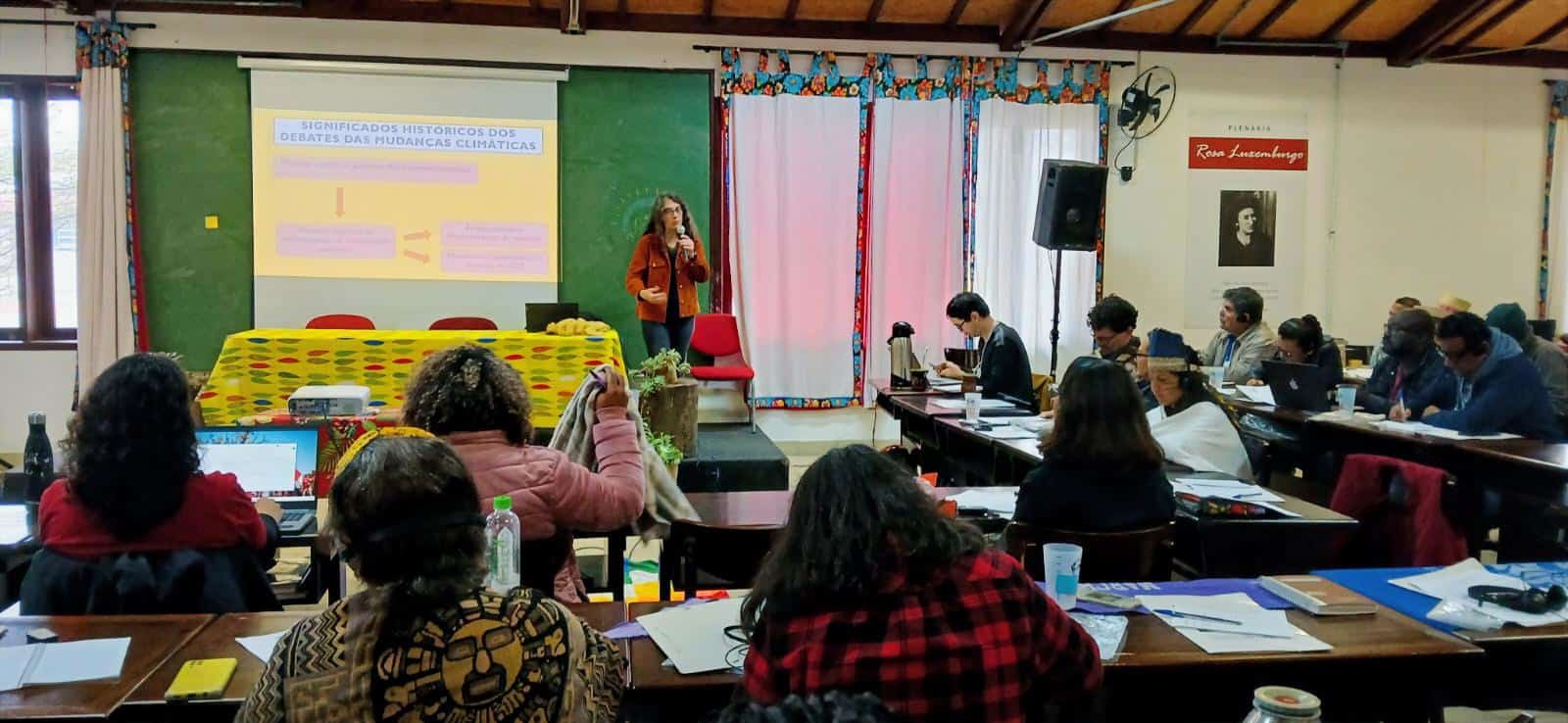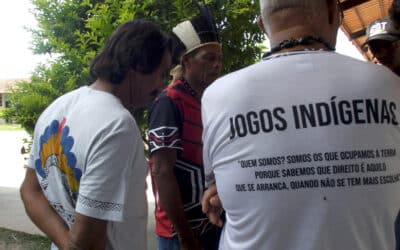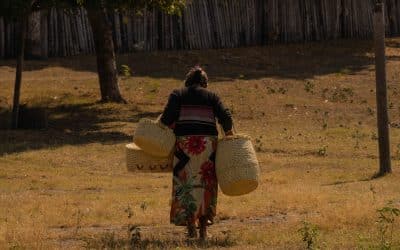Notes prises lors de la rencontre sur les marchés de la nature à Guararema
Par Valentina Figuera Martínez et Andrea Echeverri, Coalition mondiale pour les forêts (GFC)
8/8/2025
Letícia Tura, directrice exécutive de FASE, parle des fausses solutions climatiques avec une lucidité ramifiée. Avant de monter à la tribune de l’auditorium Rosa Luxemburg de l’École Florestán Fernándes du Mouvement des sans-terre (MST) du Brésil, elle écoute attentivement ses camarades de plus de 40 organisations d’Amérique latine et des Caraïbes. Elle prend des notes dans un petit carnet orné d’une photo d’un jaguar qui, du regard profond, semble nous interpeller sur ceux qui dévorent la mémoire.
Avec un regard critique sur la crise socio-écologique, Letícia parle des fausses solutions dans les négociations climatiques et tient un discours frontal contre les racines structurelles de la perte de biodiversité et des écosystèmes forestiers.
Continuer en anglais…
Tura’s talk was part of the Meeting on Nature Markets, organized by GRAIN and the Coordinadora Latinoamericana de Organizaciones del Campo (CLOC)/Vía Campesina, with social movements and organizations from around 20 countries across Latin America and the Caribbean. It was held in Guararema, not far from the Brazilian capital city, from July 21 to 24, 2025.
Ahead of the upcoming Climate Change Conference (COP 30) and People’s Summit in Belém this November, it was a valuable opportunity to build common understandings about the impacts of projects aimed at the financialization of nature, which destroy thousands of acres of tropical forests and communities across the region.
Participants included civil society groups FASE of Brazil (Federação de Órgãos para Assistência Social e Educacional) and Centro de Estudios Heñói of Paraguay, both of which are members of the Global Forest Coalition, a network for rights-based forest protection that turns 25 this year. At the meeting, they offered critiques of mechanisms like REDD+, the Tropical Forest Forever Facility (TFFF), biodiversity markets, and carbon markets, the latter of which includes what’s known as carbon farming. GFC members and campaigners spoke up to expand on the critical assessment of schemes for the financialization of nature and defined strategies for territorial defense throughout the region.
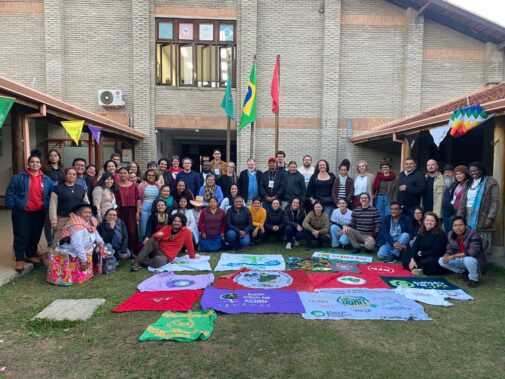
Organizations and social movement representatives at the opening session of the Meeting on Nature Markets. Photo: Andrey Martínez, CLOC/La Vía Campesina.
“The climate change debate isn’t just technical; it’s also political: it has to do with the class struggle, gender injustices, and disputes over the development model. The logic behind the debate can’t just be about emissions reductions and market ‘solutions.’ This debate is political, it’s about the type of society we want to build, and it’s in conflict with the business sector that tries to impose its vision of the world on us,” Tura said.
The region of Latin America and the Caribbean has the highest concentration of carbon market projects in the world, partly due to the region’s rich ecosystems, such as the Amazon, the Gran Chaco, and the Mata Atlántica (Brazil’s Atlantic Forest), biomes that are coveted by those seeking to implement false climate solutions. Such projects typically involve greenwashing, fraud, land grabbing, rights violations, and deforestation; however, they are frequently the focus of negotiations on climate and biodiversity finance.
In 2024, in the Brazilian Amazon alone, more than half of the carbon credit projects—which occupy a total of 78,000 square miles—overlapped public lands. Among the companies that bought these carbon credits to compensate for their greenhouse gas emissions are Netflix, Air France, Delta Air Lines, Airbnb, Takeda Pharmaceutical Co., Spotify, and Boeing.
In addition to rigorous critiques of the most well-known false climate solutions in the region, the meeting also raised the alarm about other carbon credit schemes associated with monoculture tree plantations and so-called carbon farming. According to a report by GRAIN, carbon markets based on afforestation and reforestation have gobbled up 9 million hectares across the Global South, and have given a boost to the territorial expansion of commercial reforestation companies, whose impacts have been widely denounced.
Carbon farming is based on the false premise that carbon can be accumulated in soils through agricultural practices such as zero tillage (no plowing) or pasture rotation and new varieties with deep roots, which are linked to industrial livestock farming. Corporations like the meat giant Minerva, which, through its Renove program, promotes “carbon neutral meat” and also sells credits, have been denounced for their ties to deforestation and land grabbing in the Brazilian Amazon.
A case study of Hacienda San José in Colombia published by GFC demonstrated the repercussions for the Indigenous Sikuani community—and particularly women—of a project that is in the process of obtaining carbon credits and aims to produce 450,000 cattle in a way that is certified “carbon negative.”
The reality is changing, and organizations and social movements are adapting their strategies for the defense and care of the territories and communities.
“These days, we see that the debate isn’t just about carbon markets in a strict sense,” Tura said. “Rather, there are different forms of appropriation of forests and nature’s common goods, such as the datafication of agriculture and the digitalization of territories. However, we see powerful new forms of resistance. Women play a key role; they’re on the front lines of resistance. We’ve heard some upsetting stories at the meeting, but also tales of resistance in the face of market-based projects and reproduction of the communitarian societies that we want to build. Agroecology, the management of nature’s common goods, community funds, saving and exchanging seeds—these are some of the forms of living resistance in our region.”
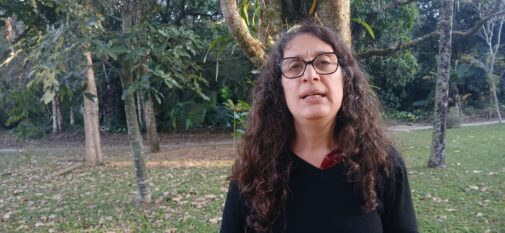
Letícia Tura of FASE at the Meeting on Nature and Markets in Guararema, Brazil. Photo: Valentina Figuera Martínez.
Omar Yampey, the executive director of Centro de Estudios Heñói, leads struggles against big agribusiness and monocultures in Paraguay. A careful and eloquent speaker, he is an expert on the forestry business that has caused social and environmental harm in that country at the hands of companies like Forestal San Pedro and Forestal Apepu, which together control over 17,000 hectares of monoculture eucalyptus plantations in Paraguay. They are both part of Fondo Arbaro, a Green Climate Fund program.
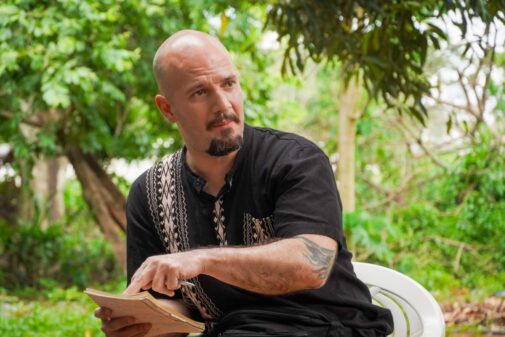
Omar Yampey of Centro de Estudios Heñói. Photo: Mombú Audiovisual.
“False solutions contain elements of classical forms of extractivism and agribusiness. The Paraguayan government has a policy of widespread exploitation of eucalyptus monocultures. In northern Paraguay, the indigenous communities are asking for our help to understand the murky proposals on carbon markets. It’s not a moral issue in the sense of judging communities that do accept carbon markets, but rather, it’s a political issue. We have to position ourselves in response to this scenario,” Omar said.
When the Global North justifies its destruction, the perpetrators won’t be able to claim that the peoples of the South stayed silent. They won’t think we went down without a fight. We’re speaking out, resisting, and enduring, with our real solutions. Let’s keep it that way.
Translated from the Spanish by Megan Morrissey.

